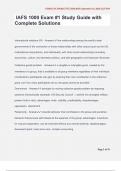©EMILLYCHARLOTTE 2024-2025 September 14, 2024 12:27 PM
IAFS 1000 Exam #1 Study Guide with
Complete Solutions
International relations (IR) - Answer✔️✔️-the relationships among the world's state
governments & the connection of those relationships with other actors (such as the UN,
multinational corporations, and individuals), with other social relationships (including
economics, culture, and domestic politics), and with geographic and historical influences
Collective goods problem - Answer✔️✔️-a tangible or intangible good, created by the
members of a group, that is available to all group members regardless of their individual
contributions; participants can gain by lowering their own contribution to the collective
good, yet if too many participants do so, the good cannot be provided
Dominance - Answer✔️✔️-principle for solving collective goods problem by imposing
solutions hierarchically (example: UN Security Council -> world's five strongest military
powers hold a veto); advantages: order, stability, predictability; disadvantages:
oppression, resentment
Reciprocity - Answer✔️✔️-rewards behavior that contributes to the group and punishes
behavior that pursues self-interest at the expense of the group; advantages: incentives
for mutual cooperation, can be enforced without any central authority; disadvantages:
downward spiral, fuels arms race, complex accounting
Page 1 of 19
, ©EMILLYCHARLOTTE 2024-2025 September 14, 2024 12:27 PM
Identity - Answer✔️✔️-care about the interests of others in that community enough to
sacrifice their own interests to benefit others; advantages: sacrifice for group, refine
interests; disadvantages: demonizes out-groups
Conflict & cooperation - Answer✔️✔️-the types of actions that states take toward each
other through time
International security - Answer✔️✔️-focuses on questions/issues of war and peace
International political economy (IPE) - Answer✔️✔️-the study of the politics of trade,
monetary, and other economic relations among nations, and their connection to other
transnational forces
State - Answer✔️✔️-a territorial entity controlled by a government and inhabited by a
population
Civil society - Answer✔️✔️-the population inhabiting the a state (to the extent that it has
formed institutions to participate in political or social life)
International system - Answer✔️✔️-the set of relationships among the world's states,
structured by certain rules & patterns of interaction (modern system in place for less
than 500 years, prior = mixed & overlapping political units like city-states, empires, etc.)
Nation-states - Answer✔️✔️-states whose populations share a sense of national identity,
usually including a language and culture
Substate nationalism - Answer✔️✔️-when people identify with a nationality their state
government does not represent, fight to form their own state -> gain sovereignty over
their territory & affairs
Page 2 of 19
, ©EMILLYCHARLOTTE 2024-2025 September 14, 2024 12:27 PM
Gross Domestic Product (GDP) - Answer✔️✔️-the size of a state's total annual economic
activity
Nonstate actors - Answer✔️✔️-called transnational actors when they operate across
international borders; actors other than state governments that operate either below the
level of the state (that is, within states) or across state borders
Intergovernmental organizations (IGOs) - Answer✔️✔️-an organization (such as the
United Nations & its agencies) whose members are state governments (states often
take action through these first); example: the World Trade Organization (WTO), NATO,
African Union (AU)
Nongovernmental organizations (NGOs) - Answer✔️✔️-A transnational group or entity
(such as the Catholic Church, Greenpeace, or the International Olympic Committee)
that interacts with states, multinational corporations (MNCs) other NGOs, &
intergovernmental organizations (IGOs)
Different levels of analysis - Answer✔️✔️-Individual: concerns the perceptions, choices, &
actions of individual human beings (ex: leaders)
Domestic: also called state or societal, concerns the aggregations of individuals within
states that influence state actions in the international arena (ex: democracy, gender)
Interstate: also called international or systemic, concerns the influence of the
international system upon outcomes (ex: wars, IGOs)
Global: seeks to explain international outcomes in terms of global trends and forces that
transcend the interactions of states themselves (ex: terrorism, North-South gap)
Page 3 of 19




